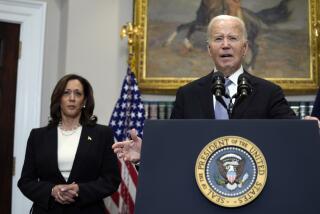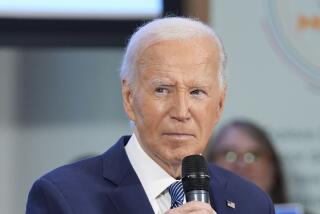Signs Point to a Rocky Path for Lieberman
- Share via
A staff shake-up and slap from the NAACP this week are just the latest signs of the problems facing presidential hopeful Joe Lieberman, whose strategy for winning the nomination faces deep skepticism from many fellow Democrats.
Although he sits atop most national polls as the party’s preferred candidate -- thanks in large measure to his status as the 2000 vice presidential nominee -- Lieberman is lagging in the crucial leadoff states of Iowa and New Hampshire.
Moreover, in a year when angry partisans are hungry for red-meat rhetoric from the Democratic candidates, the affable senator from Connecticut is taking a more subdued approach. “Democratic primary voters tend to be activists: environmental activists, civil rights activists, pro-choice activists,” said Donna Brazile, who managed Al Gore’s 2000 presidential campaign. With Lieberman, “there’s a failure to connect on a basic level with Democratic primary voters.”
Brazile and others caution that it remains early in the Democratic contest, with no clear front-runner. “It’s still a hot race,” she said.
And staff shake-ups are hardly unusual, particularly at this formative stage of the campaign. Then-Vice President Gore had his own upheaval in the early fall of 1999 -- he slashed costs and became a more focused and aggressive candidate.
Still, Lieberman’s middling performance so far has been one of the surprises of this campaign, given the expectations that followed his exuberant and history-making performance as the first Jewish candidate to run for national office on a major party ticket.
On Tuesday, he reported raising just more than $5 million during the three months ending June 30 -- a notable improvement over his performance earlier in the year. His total receipts for the year placed him third in the nine-candidate field.
But Lieberman continued to spend money at a brisk pace, drawing down the reserves he may need to compete once voters start paying closer attention. His cash on hand ranked fifth among the Democrats.
Meantime, there have been strains within the campaign between political strategists and members of Lieberman’s Capitol Hill staff.
The shake-up announced Monday was part of an effort to streamline the campaign’s costs and its unwieldy decision-making process.
As one consequence, Lieberman’s top fund-raiser, Shari Yost, and her deputy have both moved into more limited consulting roles, at reduced salaries.
Also taking 20% pay cuts were two of Lieberman’s children, Matt and Rebecca, who were being paid $100,000 salaries for their fund-raising work. And the campaign is looking at other ways to trim expenses, including cutbacks in staff travel.
“As we start the third [fund-raising] quarter, every presidential campaign is retooling and asking what do we need to do to improve as we move forward,” said Jano Cabrera, a Lieberman spokesman. “We’re trying to do that by building on the strength of the second quarter [fund-raising], while tightening up on expenses at the same time.”
But more fundamental questions surround Lieberman’s positioning in the Democratic field and his strategy of waiting for a breakthrough after the early voting in Iowa and New Hampshire.
A favorite of party centrists, Lieberman is the most conservative of the Democratic candidates on an array of issues. He unabashedly supported war with Iraq, backs experimental school vouchers, proudly boasts of being a “pro-business” Democrat and has many enemies in Hollywood, thanks to his condemnations of sex and violence in mass entertainment.
Temperamentally, Lieberman is more suited to smiling than slashing -- an attribute that still rankles many in the party who remember his amiable debate with his GOP counterpart, Dick Cheney, during the 2000 presidential campaign, and his conciliatory demeanor during the Florida recount that decided the election.
“There seems to be a significant portion of Democrats who want to see a candidate who rhetorically punches [President] Bush in the face every day,” said Anita Dunn, a party strategist who is sitting out the primary contest. “That’s not Joe Lieberman’s style.”
All of that may have contributed to the anger that bubbled over when Lieberman and two other candidates -- Reps. Richard A. Gephardt of Missouri and Dennis J. Kucinich of Ohio -- skipped Monday’s National Assn. for the Advancement of Colored People candidate forum.
The president of the civil rights group blistered the three no-shows, drawing a standing ovation.
On Tuesday, the Lieberman campaign sought to repair some of the damage he may have suffered among a key Democratic constituency. “We regret the fact we weren’t able to attend,” Cabrera said. “We hope to mend relations in the future” with the group.
Perhaps Lieberman’s biggest gamble is his hope that his candidacy can survive potentially third-place -- or worse -- finishes in Iowa’s Jan. 19 caucus and New Hampshire’s Jan. 27 primary. As Lieberman envisions it, he will vault to the head of the pack in contests a week later in South Carolina, Oklahoma and Arizona. Those more conservative states -- among several voting that day -- would presumably be friendlier turf for him.
But the rebuke from the NAACP could be a blow to part of Lieberman’s game plan: In South Carolina, blacks are likely to comprise at least a third of the Democratic primary vote.
And several other candidates have tried the strategy of riding out a couple of early key defeats -- including Gore, when he first ran for president in 1988.
In recent times, none has managed to win a presidential nomination.
This time is different, Lieberman strategists insist, and some analysts agree that may be so. If, for instance, Iowa and New Hampshire produce different winners -- and neither seemed to have much momentum -- it could provide an opening for Lieberman, assuming he still had the financial wherewithal.
“It’s a risk,” said Dunn, who managed former New Jersey Sen. Bill Bradley’s unsuccessful primary fight against Gore in 2000. “But it may also be the best hand that can be played.”
For good or ill, Lieberman has Gore to thank for the position he finds himself in today. The former vice president boosted Lieberman to national prominence by selecting him as his running mate three years ago.
But he also cost Lieberman precious time by equivocating on another White House run, delaying until December his decision to remain on the sidelines.
While Lieberman kept a pledge to wait him out, other candidates courted Gore donors and members of his 2000 campaign team.
By the time Lieberman entered the race, many of Gore’s old backers were already committed.
Lieberman may have done the honorable thing, said Brazile, who is giving advice to several of the Democratic hopefuls this time, but that isn’t much help to him now.
He may get credit somewhere “in another life,” she said. “But not in this one. This is politics.”
More to Read
Get the L.A. Times Politics newsletter
Deeply reported insights into legislation, politics and policy from Sacramento, Washington and beyond. In your inbox twice per week.
You may occasionally receive promotional content from the Los Angeles Times.











